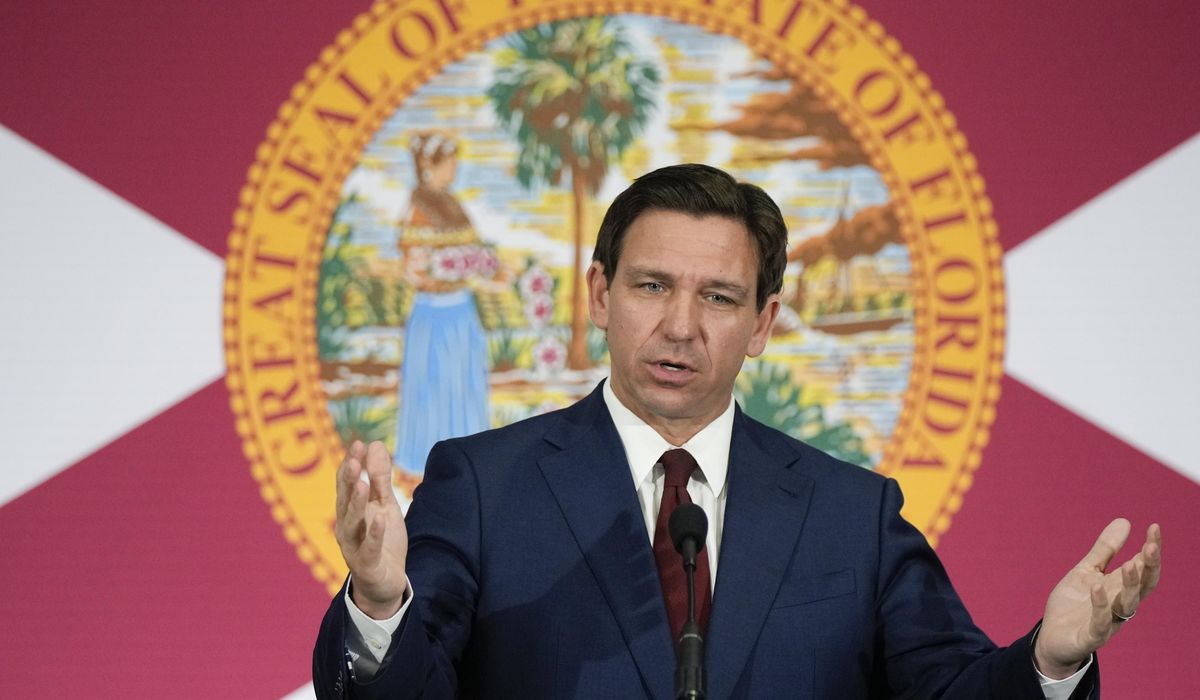


Six conservative-trending Southern states have launched an alternative accreditor to root out “woke” indoctrination in public colleges and universities.
Florida Gov. Ron DeSantis joined officials from Georgia, Texas, Tennessee, South Carolina and North Carolina at a Thursday event in Boca Raton announcing their participation in the newly formed Commission for Public Higher Education.
“Florida has set an example for the country in reclaiming higher education — and we’re working to make that success permanent,” said Mr. DeSantis, a Republican. “That means breaking the activist-controlled accreditation monopoly.”
State education leaders said the commission would prioritize academic outcomes over ideological expectations in accreditation, a federally recognized practice of certifying institutional standards through periodic reviews.
“A more focused and effective approach to accreditation will bring down costs, benefit students and build confidence in public higher education,” said Peter Hans, University of North Carolina System president. “By creating an accreditor closely focused on the needs and responsibilities of public universities, we can help strengthen these vital institutions.”
Participating state systems will still allow each campus to choose an accreditor, and it remains unclear whether academia will accept the new commission.
“We believe providing more choice and a competitive marketplace will be good for all higher education,” said Randy Boyd, president of the University of Tennessee System. “While UT’s universities will still have the right to choose which accreditor they want to work with, this initiative will provide them another option.”
The commission marks a break from the Southern Association of Colleges and Schools Commission on Colleges, a longstanding accreditor that has criticized Florida and North Carolina for political interference in academic governance.
The Washington Times reached out to the Georgia-based Southern Association and the Education Department for comment.
Republican lawmakers in the six states have moved in recent years to purge “divisive concepts” surrounding racism and gender identity from public instruction. All six states voted in November for President Trump, who has issued executive orders backing up those policies.
“Collaborating with neighboring states lets us put resources where they make the biggest difference, and I look forward to the success of an effort that increases accountability and drives meaningful innovation,” said University System of Georgia Chancellor Sonny Perdue, a former Republican governor.
Reached Friday for comment, some affected academics criticized the new commission as a DeSantis-led effort to defy accepted academic standards.
“For example, Florida’s universities replaced general education programs with a single, legislature-imposed program last year, without faculty input,” said Adriana Novoa, a Latin American history professor at the University of South Florida and plaintiff in two lawsuits challenging DeSantis education policies. “No reputable accreditation agency would accept this, prompting the creation of one aligned with this political agenda.”
While it can take four or more years for the Education Department to recognize a new accreditor, the Trump administration has pledged to streamline the process.
“Given the Trump administration’s education policies, I would expect this new accreditor to be approved quickly,” said Amanda Phalin, a University of Florida business professor and former member of the Florida Board of Governors, which manages the State University System of Florida.
“Conservatives have for some time been calling out accreditors for what they view as ‘woke’ or pro-DEI policies embedded in accreditation requirements,” said Ms. Phalin, referring to the initialism for diversity, equity and inclusion.
She said she would wait to see if the new commission allows true “viewpoint diversity” or ends up committing the same kind of censorship “on the other end of the ideological spectrum.”
The other state college networks that announced their participation in the new commission are the University of South Carolina System and the Texas A&M University System.
“In recent legislative sessions, our top state officials have sought a more reasonable and transparent pathway toward accreditation,” said Glenn Hegar, incoming chancellor of the Texas A&M University System.
Thad H. Westbrook, chair of the University of South Carolina Board of Trustees, described the commission as an exercise in “innovating accreditation.”
“The innovations we expect to implement will benefit students while making accreditation more efficient and more focused on outcomes, quality, and success,” Mr. Westbrook said.
• Sean Salai can be reached at ssalai@washingtontimes.com.
